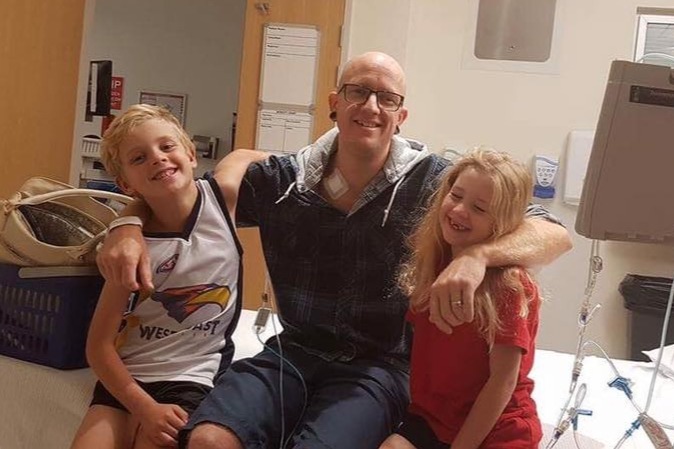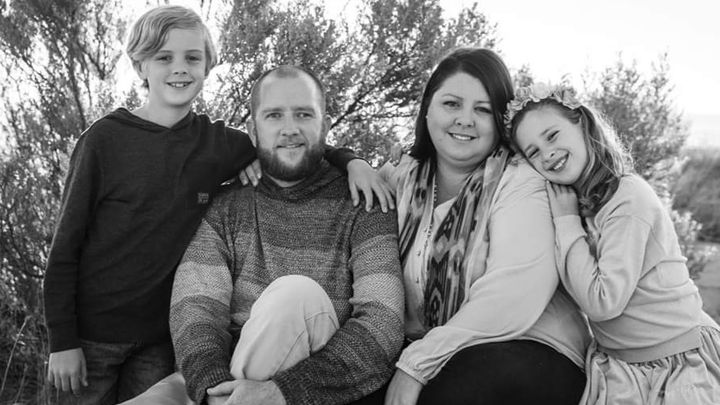Donation protected
Cancer is not only emotionally and physically devastating, but it is also financially crippling.
Please donate as little or as much as you can to help support my brother in law Gilly and family as he undergoes yet another round of brutal cancer treatment.
Any donation and page sharing is so appreciated and I know this will help ease some of the financial stress and pressure the Gilchrist's face during this extremely difficult time.
Gilly's story
Gilly has Urachal Cancer, more specifically Urachal Mucinous Adenocarcinoma.
It’s very rare. Literally one in a million rare and needs aggressive treatment.
It’s not caused by anything in particular, just a combination of a development anomaly and bad luck.
In 2017 Gilly went through a monster surgery for cancer followed by months of grueling chemo treatment. Gilly officially went into remission for a year (yay!).
However, in 2019 the cancer had returned... and not only did he have to have an entire vertebrae removed and replaced with a metal cage and a bone graft from his hip but he had to deal with weeks of radiation every day.
Sadly the cancer has spread throughout his spine and other bones in his arm.
Gilly begins major chemo treatment in March 2020.
What a champion. My brother in law, your friend, your brother, your cousin, your son, your coach, your co-worker, your chosen family, a husband and a devoted father of 2 amazing kids.
Please show your support and donate to help my family.

What is Urachal Cancer?
Urachal cancer is a very rare type of cancer arising from the urachus or its remnants. The disease might arise from metaplasic glandular epithelium or embryonic epithelial remnants originating from the cloaca region.
It occurs in roughly about one person per 1 million people per year varying on the geographical region. Men are affected slightly more often than women mostly in the 5th decade of life but the disease can occur in also in other age groups.
It can involve the urinary bladder, but is not bladder cancer in the usual sense. Urachal cancer can occur at any site along the urachal tract.
Urachal cancer can exist for some years without any symptoms. The most frequent initial symptom is haematuria, but mucinuria (mucin in the urine), local pain or swelling, recurrent local or urinary tract infections and umbilical discharge can be seen.
Follow Gilly's page below for more information on his cancer journey and support people with bladder cancer by raising awareness -
https://www.facebook.com/gillyoneinamillionurachalcancer/
Please donate as little or as much as you can to help support my brother in law Gilly and family as he undergoes yet another round of brutal cancer treatment.
Any donation and page sharing is so appreciated and I know this will help ease some of the financial stress and pressure the Gilchrist's face during this extremely difficult time.
Gilly's story
Gilly has Urachal Cancer, more specifically Urachal Mucinous Adenocarcinoma.
It’s very rare. Literally one in a million rare and needs aggressive treatment.
It’s not caused by anything in particular, just a combination of a development anomaly and bad luck.
In 2017 Gilly went through a monster surgery for cancer followed by months of grueling chemo treatment. Gilly officially went into remission for a year (yay!).
However, in 2019 the cancer had returned... and not only did he have to have an entire vertebrae removed and replaced with a metal cage and a bone graft from his hip but he had to deal with weeks of radiation every day.
Sadly the cancer has spread throughout his spine and other bones in his arm.
Gilly begins major chemo treatment in March 2020.
What a champion. My brother in law, your friend, your brother, your cousin, your son, your coach, your co-worker, your chosen family, a husband and a devoted father of 2 amazing kids.
Please show your support and donate to help my family.

What is Urachal Cancer?
Urachal cancer is a very rare type of cancer arising from the urachus or its remnants. The disease might arise from metaplasic glandular epithelium or embryonic epithelial remnants originating from the cloaca region.
It occurs in roughly about one person per 1 million people per year varying on the geographical region. Men are affected slightly more often than women mostly in the 5th decade of life but the disease can occur in also in other age groups.
It can involve the urinary bladder, but is not bladder cancer in the usual sense. Urachal cancer can occur at any site along the urachal tract.
Urachal cancer can exist for some years without any symptoms. The most frequent initial symptom is haematuria, but mucinuria (mucin in the urine), local pain or swelling, recurrent local or urinary tract infections and umbilical discharge can be seen.
Follow Gilly's page below for more information on his cancer journey and support people with bladder cancer by raising awareness -
https://www.facebook.com/gillyoneinamillionurachalcancer/
Co-organizers (4)
Tessa Alexandra
Organizer
Kallaroo, WA
Olivia A
Co-organizer
Olivia Ansell
Co-organizer
Reece Kiriakidis
Co-organizer
